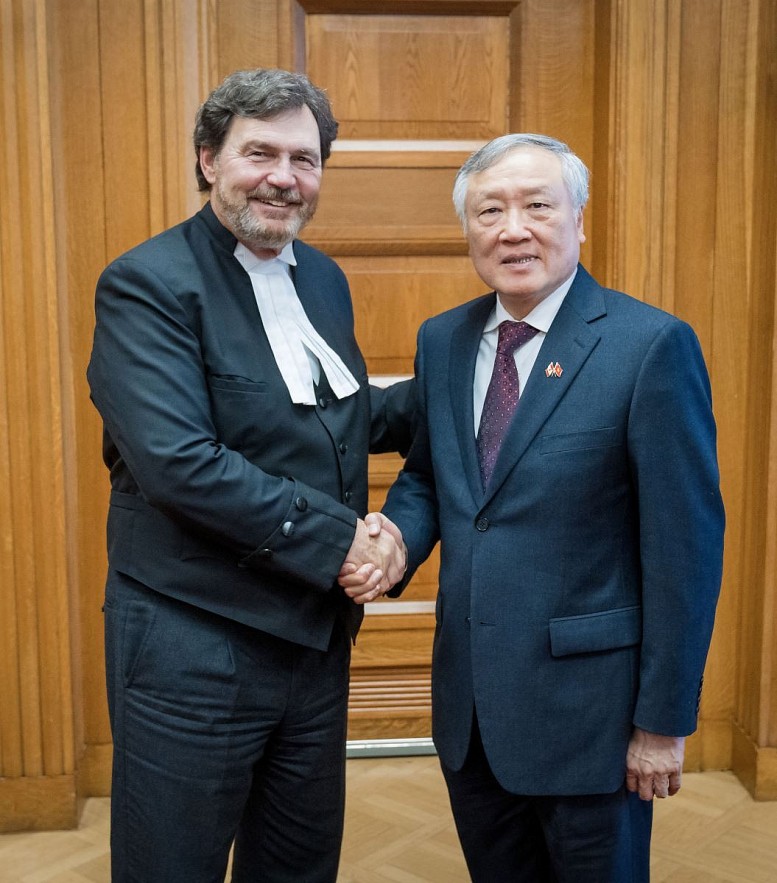
|
| Chief Justice of the Supreme Court of Canada Richard Wagner worked with the delegation of the Supreme People’s Court of Vietnam. Photo: VNA |
During a working session with the Supreme Court of Canada, Nguyen Hoa Binh, chief justice of the Supreme People’s Court of Vietnam, said upgrading relations to the comprehensive partnership helped trade and investment of the two countries develop rapidly.
The two sides are striving to reach a bilateral value of US$10 billion. In addition to investment cooperation, tourism, and people-to-people exchanges are also developing strongly.
Currently, Vietnam has about 21,000 students studying in Canada and a community of nearly 300,000 people living there. Therefore, judicial cooperation between the two sides is an inevitable requirement.
According to Chief Justice of the Supreme Court of Canada Richard Wagner, cooperation in the judicial field is not commensurate with the needs and potential of the two countries’ relationship.
Richard Wagner emphasized that in the context of international integration, no national court can develop without international cooperation. The Supreme Court of Canada wishes to strengthen cooperation and is willing to share experiences with Vietnam.
At a meeting with the Chief Justice of the Canadian Judicial Institute, Nguyen Hoa Binh raised the issue of cooperation in training between the Canadian Judicial Institute and the Vietnam Court Academy to improve the capacity of Vietnamese judges through a program focusing on updating legal knowledge, professional skills and social understanding of the Canadian Judicial Institute.
During the business trip, the Vietnamese delegation also exchanged shared experiences and court skills with units in Canada’s Department of Justice. Canada shared with Vietnam information about the court system, judicial independence, specialized types of Canadian courts, and juvenile justice issues.

|
| Chief Justice of the Vietnam Supreme People’s Court Nguyen Hoa Binh (right) and Chief Justice of the Supreme Court of Canada Richard Wagner. Photo: thainguyen.gov.vn |
Canadian businesses consider Vietnam as a country with the most opportunities in the ASEAN regionSpeaking at the Workshop “Five years of implementing CPTPP: Vietnam-the door to Southeast Asia for Canadian businesses” on October 19, TB Nguyen, director of the Canada-ASEAN Business Council (CABC), cited the agency’s latest report as saying that Canadian businesses consider Vietnam as the country with the most opportunities in the ASEAN region because it is emerging as a new hub for trade, investment, and innovation. Businesses planning to establish facilities in Vietnam such as Customer Maps or Senescene Life also assess that Vietnam is a dynamic, potential market. This is the time for Alberta businesses to seize business opportunities in Vietnam and take advantage of Vietnam to enter ASEAN. Vietnamese Trade Counselor in Canada Tran Thu Quynh said free trade agreements such as CPTPP are opening up many opportunities for businesses in both Canada and Vietnam. After 5 years of implementation, now is the “golden” time for small and medium enterprises of both sides to reach out to the world and increase their scale to compete with multinational companies. In addition to benefits from tax reduction, agreements help businesses operate in a transparent legal environment, with investment and intellectual property protection. In the context that Canada is promoting the Indo-Pacific Strategy, Canadian businesses will also have many support mechanisms to expand operations in ASEAN, including Vietnam. |
Vietnam boosts IP rights to attract investment
According to experts, one of the key factors limiting the arrival of quality investment flows in has been its poor enforcement of intellectual property rights.
Intellectual property legislation is a common requirement within the framework of many free trade agreements to which Vietnam is a signatory.
FTA – Driving force for growth in 2021
With a number of free trade agreements now signed, Vietnam finds itself in its strongest-ever position on the international trade map. Its proactive participation in agreements and the demonstration of its leading role in the region and the world have changed the country’s position and profile, with economic experts emphasising that its FTAs will be a driving force for growth this year and beyond.








